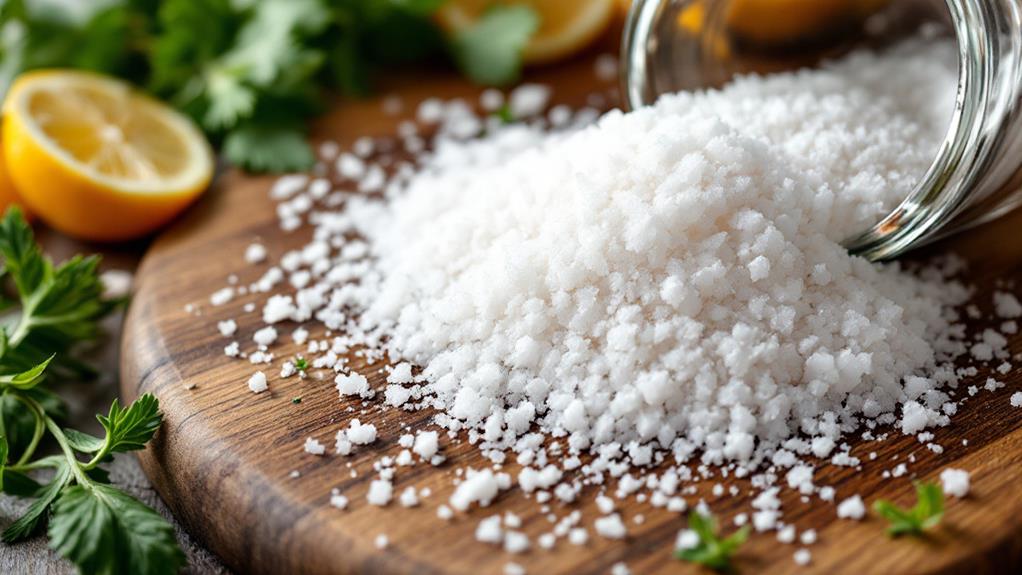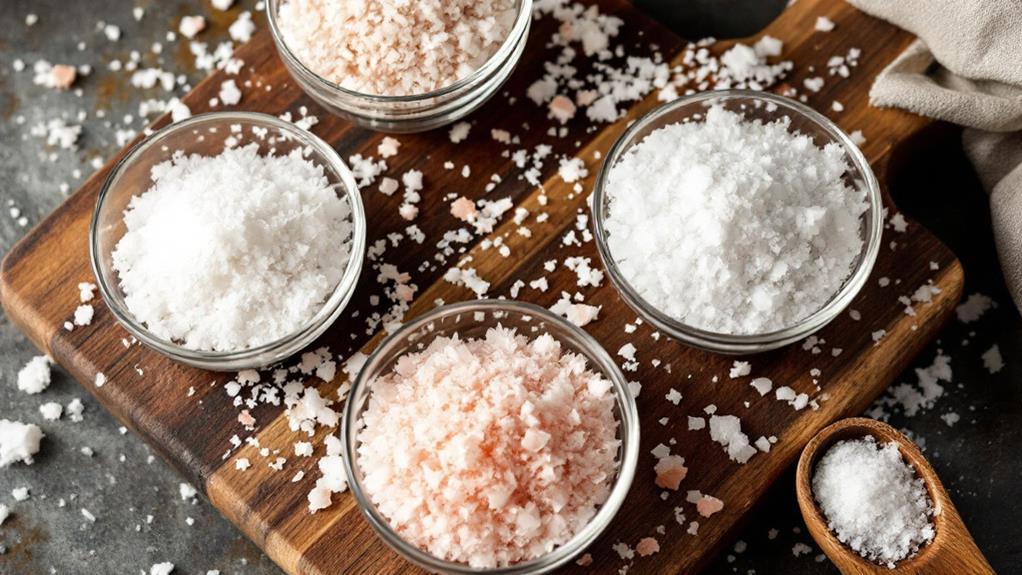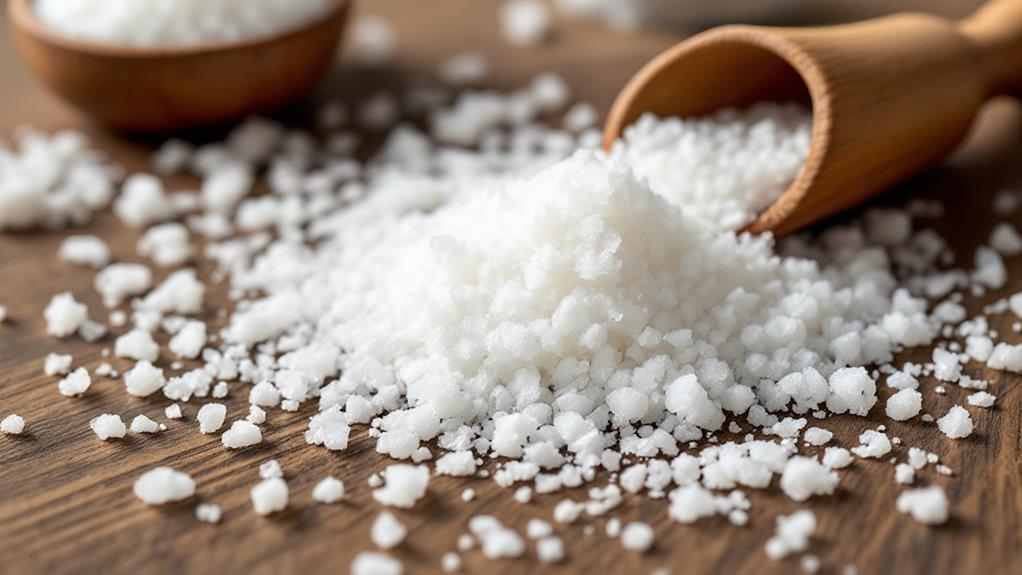The Ultimate Guide to Kosher Salt: Uses and Benefits

Kosher salt is your go-to for precise seasoning with its large grains and pure taste, free from additives. It's perfect for koshering meat, consistent with Jewish dietary laws. Use it for even flavor distribution in meats and veggies, or to add a satisfying crunch as a finishing touch. Kosher salt is also a key player in pickling and brining, helping improve food's natural flavors. While supporting hydration and aiding digestion in moderation, it provides a pure sodium source. Conversion is simple: 1 teaspoon of table salt equals 1¼ teaspoons of kosher salt. There's much more to uncover about its uses and benefits.
Understanding Kosher Salt
Kosher salt stands out due to its larger, coarser grains, which give you more control when seasoning your dishes. This unique texture not only improves flavor but also plays a vital role in koshering meat, a process integral to Jewish dietary guidelines. When you use kosher salt, you're embracing a tradition that helps draw blood from meat, adhering to kashrut without necessarily needing kosher certification. Remember, kosher salt makes seasoning more precise because it allows you to pinch and sprinkle exact amounts, unlike finer table salt.
Although the term "kosher" relates to its grain size rather than dietary compliance, it still offers benefits in the kitchen. Kosher salt doesn't contain additives, making it a purer choice compared to table salt, which often has anti-caking agents. This purity guarantees that your dishes have a clean, unadulterated taste.
When comparing salt vs. kosher salt, the latter provides lower sodium content per volume due to its larger grains, but keep in mind the sodium content remains the same by weight. So, measure mindfully to maintain balance in your culinary creations. With kosher salt, you gain texture, control, and flavor without compromise.
Types of Kosher Salt
When exploring the "Types of Kosher Salt," you'll find two primary categories: coarse-grained mined salt and kosher-certified salt. Coarse-grained salt is a go-to for culinary purposes because of its ability to improve flavor distribution without the risk of oversalting. Mined from underground deposits, these salts are often processed to maintain purity and meet kosher standards.
Kosher-certified salt, on the other hand, adheres strictly to Jewish dietary laws, ensuring every step of its production is compliant. Examples include Pacific Blue® Kosher Flake Sea Salt and Cyprus Flake Salt by Artisanal. Both are OU Kosher certified, offering chefs unique textures and aesthetic appeal.
Here's a quick look at what makes these types of kosher salt stand out:
- Coarse-grained salt: Perfect for even seasoning and reduced risk of oversalting.
- Kosher-certified salt: Meets strict kosher dietary laws.
- Pacific Blue® Kosher Flake Sea Salt: Known for its light, flaky texture.
- Cyprus Flake Salt by Artisanal: Features pyramid-shaped flakes.
- Larger grain size: Distinguishes kosher salt from regular table salt.
When choosing between these types of salt, consider your culinary needs and the importance of kosher certification.
Kosher Salt Production

In the domain of salt manufacturing, kosher salt's expedition begins with two primary production methods: the solar evaporation of seawater and the mining of salt deposits. When seawater undergoes solar evaporation, it leaves behind salt crystals ready for refinement. Alternatively, mining involves extracting salt deposits, which are then sorted and processed to guarantee quality. Both methods are carefully monitored to meet kosher certification requirements, adhering to strict Jewish dietary laws.
Producing kosher salt isn't just about extraction; it's about confirming that the entire process aligns with kosher dietary laws. No non-kosher additives or methods can interfere. Each step, from refining to packaging, undergoes thorough scrutiny, assuring that the salt remains pure and suitable for kosher diets. This is where the kosher certification process plays a vital role.
Two main types of kosher salt emerge from this careful production: coarse-grained mined salt and kosher-certified salt. Brands like Pacific Blue® Kosher Flake Sea Salt and Cyprus Flake Salt by Artisanal are prime examples, celebrated for their unique textures and shapes. These salts not only improve flavor but also assure consumers that they comply with the strictest kosher standards.
Kosher Salt vs. Sea Salt
As you've learned about the careful production of kosher salt, it's fascinating to compare it with sea salt, another popular staple in kitchens worldwide. Kosher salt, mined from land deposits, boasts large, uneven grains which make it an ideal choice for hand seasoning. Its coarse-grained salt texture is particularly beloved in Jewish culinary practices. Sea salt, on the other hand, comes from evaporated seawater and can vary in grain size and texture, often offering a more delicate touch and unique flavor profile.
Here's what you need to know:
- Texture: Kosher salt's coarse texture allows for easy handling, while sea salt ranges from fine to coarse, each providing different culinary experiences.
- Sodium Content: By volume, kosher salt has a lower sodium content compared to table salt, but when weighed, it's similar. Sea salt's sodium level can vary due to its mineral content.
- Processing: Kosher salt is less processed, whereas sea salt can be more labor-intensive to harvest.
- Substitution: When substituting, keep in mind that kosher salt's grain size affects measurements.
- Culinary Uses: The distinct properties of each salt type influence their preferred uses in recipes.
Understanding these differences helps you choose the right salt for your culinary needs.
Culinary Uses of Kosher Salt

Picture a succulent roast chicken, its skin crisp and perfectly seasoned. The secret? Kosher salt. With its coarse-grained salt structure, it's your go-to for ensuring even flavor distribution across meats and vegetables. Unlike table salt, its larger crystals dissolve slowly, giving you more control to season food without overpowering it.
When it comes to pickling and brining, kosher salt's flaky texture is unbeatable. It adheres beautifully to food surfaces, ensuring the perfect preservation without any interference from anti-caking agents. Regardless of if you're brining a Thanksgiving turkey or pickling cucumbers for summer, the purity of kosher salt improves the process, preserving the integrity of your ingredients.
Chefs rave about kosher salt for finishing dishes. Those coarse grains provide a satisfying crunch and burst of flavor when sprinkled on top. Imagine a sprinkle over roasted vegetables or a freshly baked loaf of bread—pure culinary magic.
Versatility is another hallmark of kosher salt. It shines in roasting, grilling, and baking, elevating each dish's taste experience. Its purity and lack of additives make it a favorite in gourmet recipes, offering unique flavors and ensuring your dishes are free from unwanted impurities.
Health Benefits of Kosher Salt
Kosher salt, a culinary staple, offers more than just flavor enhancement; it brings several health benefits to the table. Its primary component, sodium chloride, is vital for maintaining fluid balance and proper nerve function in your body. The coarser texture of kosher salt provides a lighter and milder flavor, allowing you to have more controlled seasoning. This can help reduce your total sodium intake, which is beneficial for your health.
Health Benefits of Kosher Salt:
- Supports Healthy Digestion: It aids in producing hydrochloric acid, critical for breaking down food in your stomach.
- Balanced Electrolytes: When used in moderation, kosher salt supports hydration and healthy blood pressure levels.
- Pure Sodium Source: Free from additives and anti-caking agents, it's a cleaner choice for those sensitive to certain ingredients.
- Jewish Dietary Preference: Ideal for those following Jewish dietary laws due to its lack of additives and iodine.
- Potential Iodine Deficiency Consideration: While kosher salt doesn't contain iodine, fundamental for thyroid function, it's worth monitoring your total iodine intake.
Embracing kosher salt in your diet can offer these health benefits, making it a worthy enhancement to your kitchen.
Kosher Salt Substitutions

When you're in the kitchen and find yourself out of kosher salt, knowing how to substitute it effectively can save your dish. Kosher salt's coarse-grained texture means it takes up more volume than finer salts like table salt and sea salt. To substitute table salt for kosher salt, use a conversion ratio of 1 teaspoon of table salt for every 1¼ teaspoons of kosher salt. This adjustment guarantees you maintain the right level of sodium chloride in your recipe without altering the intended flavor.
Sea salt is another great substitute for kosher salt; however, you'll need to take into account the grain size. If your sea salt is fine-grained, use slightly less to achieve the same saltiness. For brining, kosher salt is usually preferred due to its lack of additives, but non-iodized sea salt can be a good alternative. Remember to slightly reduce the amount to prevent over-salting.
In recipes that call for kosher salt for seasoning, coarse sea salt or Himalayan pink salt can replace it. Be aware that these substitutes may introduce subtle flavor differences. Always check packaging for grain size and adjust quantities to fit your needs.
Kosher Certification Importance
For anyone following a kosher diet, understanding the importance of kosher certification is vital. Not all kosher salt is created equal; while some may refer to its grain size, true adherence to kashrut requires kosher certification. This guarantees the salt complies with strict dietary laws, assuring it's free from non-kosher ingredients and processes. To help you understand why this matters, consider the following:
- Rigorous Monitoring: Certified kosher salt undergoes careful oversight during manufacturing and packaging, often by reputable agencies like the Orthodox Union (OU).
- Religious Assurance: Kosher certification is fundamental for products used in religious and ceremonial cooking, guaranteeing they meet specific dietary requirements.
- Consumer Confidence: Seeing kosher certification on packaging gives you the certainty that the salt can be safely used in kosher food preparation.
- Avoids Confusion: Without certification, the term "kosher" might only indicate the salt's texture, not its compliance with kashrut laws.
- Vital for Kosher Meat: Certified kosher salt is often used in kosher meat preparation to adhere to dietary laws.
Incorporating kosher-certified salt into your cooking guarantees you're respecting and maintaining the integrity of your dietary practices.
Choosing the Best Kosher Salt

Selecting the best kosher salt involves more than just grabbing the initial one you see on the shelf. You need to verify it's Kosher Certified, like those with an OU label, to adhere to Jewish dietary laws. This guarantees the absence of non-kosher additives, maintaining the purity of your seasoning. The texture of kosher salt is another vital factor. Different textures, such as flaky or coarse grains, can greatly impact how you control seasoning and distribute flavors in your dishes.
Think about what you'll use the kosher salt for. Some varieties are better suited for specific culinary tasks like pickling, brining, or finishing dishes. Choosing the right type can improve the uses and benefits of your cooking. Furthermore, consider the mineral content and flavor profile. Some kosher salts offer unique tastes that can raise certain culinary experiences.
Kosher salt is typically lower in sodium per volume compared to table salt. This characteristic makes it a healthier option, as it reduces the risk of oversalting while still providing robust flavor. By considering these factors, you'll select the kosher salt that best meets your culinary needs and preferences.




